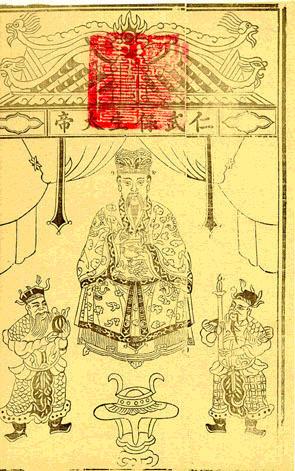Baosheng Dadi
Baosheng Dadi (Chinese: 保生大帝), also known as the "Great Emperor of Preserving Life," is a revered figure in Chinese folk religion and Taoism. He is celebrated as a god of medicine and healing, embodying the virtues of compassion and benevolence. His cult is particularly prominent in Taiwan, Fujian province in China, and among overseas Chinese communities.
Origins and History[edit | edit source]
Baosheng Dadi's historical roots can be traced back to a real person named Wu Ben (吳本), who lived during the Song Dynasty (960–1279). Wu Ben was known for his profound medical skills and dedication to saving lives. After his death, he was deified and honored as Baosheng Dadi, which translates to "Great Emperor of Preserving Life."
Over the centuries, the worship of Baosheng Dadi has evolved, incorporating elements from various religious traditions, including Buddhism and Taoism. His legend has grown, attributing to him miraculous healings and the ability to grant protection from diseases and disasters.
Worship and Festivals[edit | edit source]
Baosheng Dadi is worshipped in many temples dedicated to him, with the most famous being the Baosheng Temple in Taipei, Taiwan. This temple, established in the early 19th century, is a center of festivities, especially during Baosheng Dadi's birthday celebration on the 15th day of the third lunar month. The festival features traditional performances, such as Chinese opera, lion dances, and religious ceremonies, drawing thousands of devotees and tourists.
Worshippers pray to Baosheng Dadi for health and protection. Offerings of incense, fruits, and food are common, along with prayers for healing and blessings. The god's image is often depicted holding medical instruments, symbolizing his ability to cure ailments and bring about well-being.
Cultural Significance[edit | edit source]
The cult of Baosheng Dadi reflects the Chinese cultural emphasis on health and longevity. His veneration highlights the integration of religious faith and traditional medicine in Chinese society. Moreover, Baosheng Dadi's worship demonstrates the syncretic nature of Chinese religious practices, where deities from different traditions are revered together in a harmonious pantheon.
Baosheng Dadi's influence extends beyond religious worship, impacting Chinese art, literature, and popular culture. Stories of his life and miracles are subjects of plays, novels, and songs, contributing to the rich tapestry of Chinese cultural heritage.
See Also[edit | edit source]
Search WikiMD
Ad.Tired of being Overweight? Try W8MD's physician weight loss program.
Semaglutide (Ozempic / Wegovy and Tirzepatide (Mounjaro / Zepbound) available.
Advertise on WikiMD
|
WikiMD's Wellness Encyclopedia |
| Let Food Be Thy Medicine Medicine Thy Food - Hippocrates |
Translate this page: - East Asian
中文,
日本,
한국어,
South Asian
हिन्दी,
தமிழ்,
తెలుగు,
Urdu,
ಕನ್ನಡ,
Southeast Asian
Indonesian,
Vietnamese,
Thai,
မြန်မာဘာသာ,
বাংলা
European
español,
Deutsch,
français,
Greek,
português do Brasil,
polski,
română,
русский,
Nederlands,
norsk,
svenska,
suomi,
Italian
Middle Eastern & African
عربى,
Turkish,
Persian,
Hebrew,
Afrikaans,
isiZulu,
Kiswahili,
Other
Bulgarian,
Hungarian,
Czech,
Swedish,
മലയാളം,
मराठी,
ਪੰਜਾਬੀ,
ગુજરાતી,
Portuguese,
Ukrainian
Medical Disclaimer: WikiMD is not a substitute for professional medical advice. The information on WikiMD is provided as an information resource only, may be incorrect, outdated or misleading, and is not to be used or relied on for any diagnostic or treatment purposes. Please consult your health care provider before making any healthcare decisions or for guidance about a specific medical condition. WikiMD expressly disclaims responsibility, and shall have no liability, for any damages, loss, injury, or liability whatsoever suffered as a result of your reliance on the information contained in this site. By visiting this site you agree to the foregoing terms and conditions, which may from time to time be changed or supplemented by WikiMD. If you do not agree to the foregoing terms and conditions, you should not enter or use this site. See full disclaimer.
Credits:Most images are courtesy of Wikimedia commons, and templates, categories Wikipedia, licensed under CC BY SA or similar.
Contributors: Prab R. Tumpati, MD

